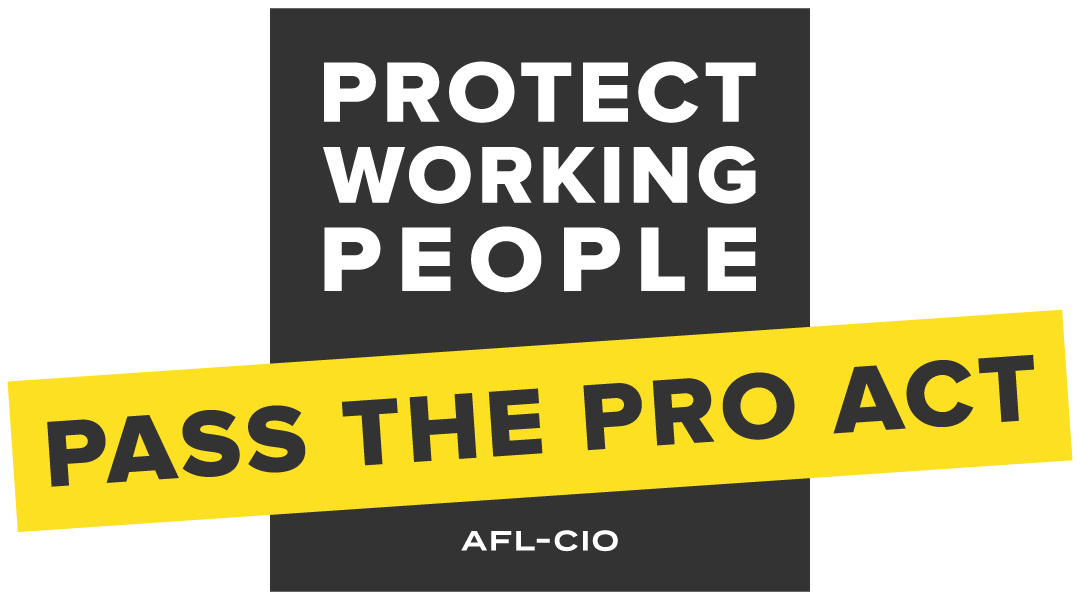THE PRO ACT IS THE KEY TO AMERICA’S FUTURE
The Protecting the Right to Organize (PRO) Act restores the right of workers to freely and fairly form a union and bargain together for changes in the workplace. It is landmark worker empowerment, civil rights and social justice legislation, and an essential part of creating an economy that works for everyone.
The American Dream Hinges on the Collective Strength of Working People
As the collective strength of workers to negotiate for better pay and benefits has eroded, the gap between rich and poor has reached levels not experienced since the Great Depression. The result is an economy that does not work, where the vast majority of the people lack the incomes or the economic security to consume or invest.
When working people come together in a union, we can negotiate for higher wages, better benefits and working conditions, and we also have a real say in critical workplace issues like time off to care for a loved one, the deployment of technology and protection from all kinds of discrimination.
The purposes of the PRO Act are simple: Ensure workers can push for the changes we want to see at our jobs without fear of retaliation and strengthen workers’ right to form a union and negotiate for those changes if we so choose.
Currently, there are no penalties for employers who illegally retaliate against or fire workers for collective action. The bill is necessary because our woefully outdated labor laws are no longer effective as a means for working people to have our voices heard.
THE PRO ACT WILL HELP EMPLOYEES ADVOCATE FOR IMPROVEMENTS AT WORK BY:
-
- Allows workers to recover full back pay, front pay, consequential damages and additional damages equal to double the owed amount.
- Imposes civil penalties up to $50,000 per violation and provides a private right of action for workers who want to enforce their rights in court; holds employers personally liable when they know about violations but refuse to address them.
- Requires employers to disclose how much they’re spending on union-busting.
-
- Amends the definition of employer so that entities that control material aspects of employees’ work are actually at the bargaining table.
- Adopts a clear test to determine employee status so that workers are not misclassified as independent contractors and therefore unable to organize.
- Narrows the definition of supervisor so that employees who make routine, commonsense workplace decisions are not excluded from their unions.
- Guarantees that workers are eligible for recovery regardless of immigration status.
-
Ensures that employers cannot:
- Fire and permanently replace workers who are on strike.
- Lock out, suspend or withhold work from employees to stop them from striking.
- Tell employees that they are independent contractors when they are actually employees.
- Force employees to attend anti-union messaging meetings.
- Change work conditions, pay or benefits while negotiating a union contract.
- Force employees to waive their right to collective and class legal action.
- Prohibit employees from using work computers for collective action.
- Empowers employees to stand in solidarity with other workers through efforts like picketing, striking or boycotting.
- Protects strikes of any duration, scope or frequency.
- Requires employers to notify each new employee of their rights under the NLRA and to post those rights in the workplace.
- Allows unions to collect fees to cover the expenses of collective bargaining, regardless of state “right to work” laws.
-
Adopts new procedures to make sure unions can reach a first contract. And requires:
- Collective bargaining to begin within 10 days of the certified union’s request to do so.
- Mediation if no contract is reached within 90 days.
- Mandatory arbitration of a two-year contract if no contract is reached through mediation.
-
- Requires employers to provide contact information for all relevant employees before the union elections take place and allows union elections to take place by mail, electronically, or at a convenient location.
- Keeps employers from intervening in administrative hearings on union representation.
- Ensures workers can form commonsense bargaining units.
- Requires the National Labor Relations Board (NLRB) to order the employer to bargain if the union wins the election, or if the employer interferes with the election and a majority of employees have already designated the union as their desired bargaining representative.
- Ensures new elections do not take place if:
- The union and employer are still bargaining.
- The employer voluntarily recognized the union.
- The union and successor employer are just starting to bargain.
- The time window for filing a petition has closed.
- Pauses union elections when unfair labor practice charges are filed.
- Requires the NLRB to seek a U.S. District Court injunction when employers may have unlawfully fired workers or otherwise interfered with their rights under the NLRA, and makes NLRB orders self-enforcing and appealable within 30 days.
